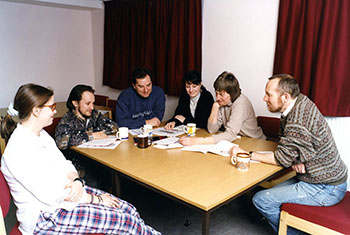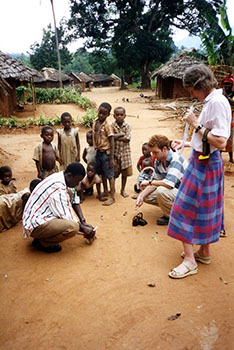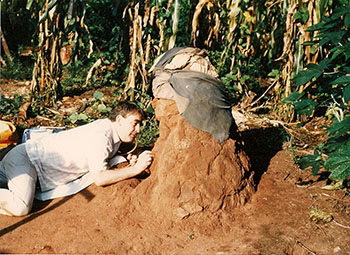History of CAEP
The Centre for Applied Entomology and Parasitology (CAEP) was formed in 1992. Its creation was driven by Professor Chris Arme as head of the School of Biological Sciences. Professor Arme, now Emeritus, served a term as President of the British Society of Parasitology and was the founding editor of the journal Parasites and Vectors. CAEP was established, and continues to this day, as an interdisciplinary research centre offering a lively and stimulating atmosphere for advanced research, training and collaboration. The first Director of CAEP was Professor Peter Ham and researchers were integrated into four major themes: Medical and Veterinary Vector Biology, Insect Immunology and Pathology, Applied Insect Ecology and Fish Parasitology and Immunology.
 Early days - Left Peter Ham, 1st CAEP director (1992-1996) with Hilary Hurd who was to play that role from 1996 to 2007, and other members of his research group in 1993.
Early days - Left Peter Ham, 1st CAEP director (1992-1996) with Hilary Hurd who was to play that role from 1996 to 2007, and other members of his research group in 1993.
Professor Hilary Hurd took over as Director of CAEP from 1996 and continued in this role until 2007. During this period CAEP became a very cohesive group, enjoying a successful weekly seminar programme and social events. Collaborative projects were initiated and consolidated in all areas, and national and international links expanded. These included studies on European bees and western thrips (Professor William Kirk), the development of novel technologies for genetic modification of mosquitoes and work on mosquito/Plasmodium interactions in collaboration with partners in East Africa (Professor Hilary Hurd). Research programmes were established to investigate the vectors of visceral leishmaniasis in North East Brazil and in Sudan (Professor Richard Ward, Dr Rhaiza Maingon and Professor Gordon Hamilton) and collaborations established with aquaculture facilities in Asia and Eastern Europe to tackle research on fish disease and immunity (Professor David Hoole).
 Right - Hilary Hurd on the hunt for mosquito samples in a Tanzanian village in East Africa
Right - Hilary Hurd on the hunt for mosquito samples in a Tanzanian village in East Africa
The rationale for CAEP had always been underpinned by the needs of new generations of students, whose enthusiasm for the disciplines of parasitology and vector biology was ignited through undergraduate modules and a postgraduate taught programme focusing on parasitology.
In 2007 Professor Richard Ward took over the leadership of CAEP, shortly after its incorporation as a research theme within the Institute for Science and Technology in Medicine. Richard remained as Director of CAEP until April 2010. Within the UK, links were forged with the Institute of Animal Health in Pirbright and their studies on sheep blue tongue virus susceptibility. An exchange programme was put in place between the School of Life Sciences and Universiti Sains Malaysia, which provided undergraduate and postgraduate students in parasitology and medical entomology with access to opportunities for international field experience as part of their courses.
 Left - Richard Ward collecting sand flies from a disused termite mount in Western Brazil
Left - Richard Ward collecting sand flies from a disused termite mount in Western Brazil
Professor Frederic Tripet was Director of CAEP from 2010 to 2022 and developed strong collaborative research partnerships with malaria-endemic countries across the globe. Tripet was a partner and field entomology technical coordinator on the Target Malaria consortium, a not-for-profit research consortium sponsored by the National Institutes for Health and the Bill and Melinda Gates Foundation that aims to develop new approaches to sterile male mosquito releases to reduce the population of malaria-transmitting mosquitoes in sub-Saharan Africa.
CAEP's current Director is Professor Toby Bruce, who can be contacted here. Bruce was appointed at Keele in 2017 and strengthened CAEP research on insect pests of crops with projects on aphid pests in the UK and fall armyworm in Kenya.
Since its inception, CAEP has seen the expansion of research in a range of areas, including mosquito transgenesis, molecular biology and genetics of kinetoplastid parasites (Leishmania spp. and Trypanosoma brucei), genetics and epigenetics of Plasmodium falciparum, cerebral malaria, insect chemical ecology and insect olfaction, plant science and crop health, drug discovery, anthropology and the development of tools and interventions. Since establishment in 1992, the Centre has produced more than 700 peer-reviewed publications in the fields of parasitology, infectious diseases, applied entomology and agricultural pest management and has made significant impacts in our understanding and control of infectious diseases and agricultural insect pests. CAEP scientists have extensive international research links which continue to grow and contribute to its global impact in research, research training and capacity building.

